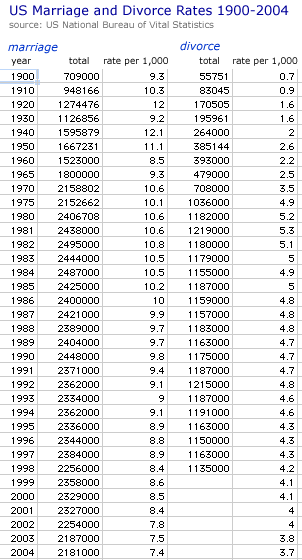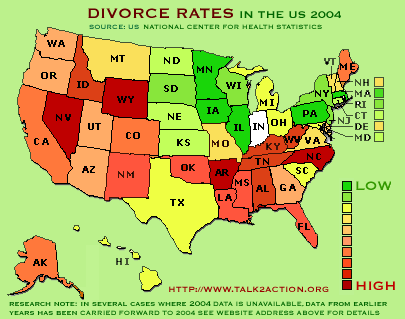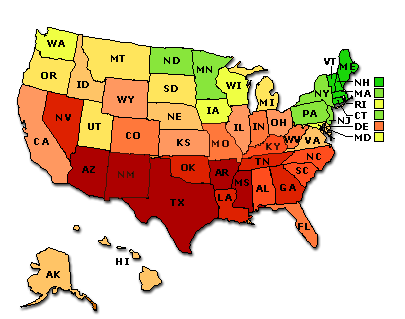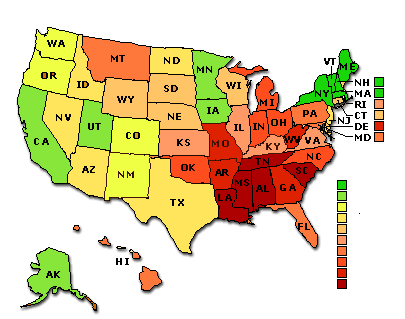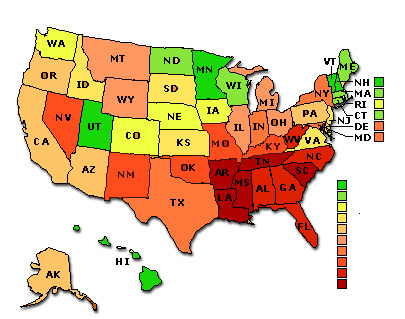|
Why the Religious Right’s NC Constitutional Ban On Gay Marriage Will Hurt the State Economy
NC's misleadingly titled "Defense of Marriage Act", just voted into the NC state constitution, probably won't have any impact on the institution of straight marriage in North Carolina, judging by the Massachusetts experience. But it likely will hurt the NC economy. That's the irony. It's not just that LGBTI Americans will be less inclined to spend their tourism dollars in NC - research shows that anti-gay bigotry is bad for the economy other ways too. [below: A classic 2006 Daily Show spoof examines religious right's claim that gay marriage has destroyed Massachusetts.]
As researcher Richard Florida has demonstrated, American urban areas that can attract "cultural creatives" - especially intelligent, talented residents - do better economically, and attracting gay residents is an important part of that. As Florida described in a 2003 USA Today op-ed,
"Research I conducted with Gary Gates, an Urban Institute demographer, shows that the big new-ideas and cutting-edge industries that lead to sustained prosperity are more likely to exist where gay people feel welcome. Most centers of tech-based business growth also have the highest concentrations of gay couples. Conversely, major areas with relatively few gay couples tend to be slow- or no-growth places. " There's a more subtle component to Florida's argument - he also points out that diversity, in itself, confers an economic advantage - because gay-rights friendly areas also tend to be more accepting of ethnic and cultural diversity in general. "Tolerance", or even outright support, for LGBTI rights works as a rather accurate proxy for acceptance of diversity in general, and diversity tends to spur innovation. Wrote Florida, in his USA Today column,
"Creative, innovative and entrepreneurial activities tend to flourish in the same kinds of places that attract gays and others outside the norm. To put it bluntly, a place where it's OK for men to walk down the street holding hands will probably also be a place where Indian engineers, tattooed software geeks and foreign-born entrepreneurs feel at home. When people from varied backgrounds, places and attitudes can collide, economic home runs are likely." This is far from a new phenomenon, I would point out -- for thousands of years, port cities - mercantile hubs which have for obvious reasons enjoyed high levels of ethnic and cultural diversity - have been known for their exceptional economic prosperity. What is most astounding about yesterday's decision, by sixty one percent of North Carolina voters, to enshrine a radically restrictive anti-gay rights amendment barring not only same-sex marriage in the NC state constitution, but also banning civil unions and domestic partnerships for both gay and straight couples, is the likelihood that South Carolina voters of the "Tar Heel" state have just sent a resounding message to exceptionally talented and economically valuable young Americans from a wide range of minority groups -- not just LGBTI citizens but Asian and Hispanic Americans, indeed just about any American minority group one cares to think of -- "you're probably not welcome here". It's unlikely that my own gay rights-friendly state, Massachusetts, will see an immediate flood of established, disgruntled gay couples fleeing institutionalized repression in the South, resettling to the Bay State. The results will be more gradual. But over time more exceptionally talented young gay and minority American citizens will opt to settle in the Bay State, where they're obviously more welcome. After eight years, legalized same sex marriage has had no discernible impact on the institution of straight marriage in the Bay State - as many straight Massachusetts residents have no doubt noticed. Dire warnings from the religious right didn't pan out; there was no downside, only the upside of an expansion of human rights for Massachusetts LGBTI residents. In 2004, opponents of same-sex marriage were emitting warnings about the alleged threat they said was posed by the legalization of same-sex marriage in Massachusetts that look even more ridiculous now than eight years ago. My favorites include a claim, from James Dobson, that gay marriage would cause [straight] families to crumble, "presaging the fall of Western Civilization itself." Another was from MA Democratic State Representative Emile J. Goguen, who warned "It's like a rolling ball of snow. It gets bigger and bigger. You allow it in Massachusetts, it'll spread to God knows where." One could have just as easily reversed the equation, to warn, "opposition to gay rights? You allow it in Massachusetts, it'll spread to God knows where". That would have proved prescient, because more U.S. states have banned same-sex marriage than have legalized it. Back in 2005, on the principle that it's always advantageous to shoot fish in a barrel - because it's hard to miss - I set out to demonstrate that same-sex marriage would have in practical terms zero impact on marriage in Massachusetts by tracking the state divorce rate. The results were predictable. In 2004, Massachusetts had one of the lowest divorce rates in the nation and four years later the MA divorce rate was still among the lowest of any U.S. state and other notable trends had even improved, leading me to write a sarcastically-titled story, MA Gay Marriage Brings Perilous Drop in Divorce, STD, Teen Pregnancy Rates?. Indeed, by 2009 the Massachusetts divorce rate had dropped to roughly the point it was at in the 1940's prior to the time when the United States entered World War Two. There are some downsides, it's fair to point out - MA has some of the most restrictive divorce laws in America. But MA also has traditionally led the nation in having some of the lowest state rates of teen pregnancy, infant mortality, and overall health ranking. Much of that, critics could argue, simply has to do with the fact that Massachusetts is a comparatively wealthy state, and wealthier American populations tend to have lower rates of teen pregnancy and infant mortality and better health. But glancing at the maps below, which I compiled back in 2005, looking North from MA, to Vermont, we notice these trends all hold in VT - which is a much less wealthy state than Massachusetts. It's hard to escape the impression that some of this is culturally driven. Vermont, by the way, legalized civil unions between same-sex couples in 2000 and legalized gay marriage in 2009. Wrapping up, back in 2009 I wrote,
"In a similar way, Galileo's insistence that the Earth revolved around the Sun and not vice-versa caused problems for opponents of the Heliocentric theory such as the Catholic Church. But, in time the Church learned accept the new outlook because scientific data supported it. So, perhaps there's hope that... critics of gay marriage may yet come to accept that after a half decade of legal gay marriage in Massachusetts, life continues as before." I'm still hoping.
map key: red=higher rates, green=lower rates Infant Mortality, 2004 Overall State Health Ranking, 2004
Why the Religious Right’s NC Constitutional Ban On Gay Marriage Will Hurt the State Economy | 4 comments (4 topical, 0 hidden)
Why the Religious Right’s NC Constitutional Ban On Gay Marriage Will Hurt the State Economy | 4 comments (4 topical, 0 hidden)
|
|||||||||||||||||||||||
| |||||||||||||||||||||||




 print page
print page
